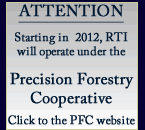
|
Digital Forests
This article was published by the University of Washington
in "The Research University and the Future of Our
State", Annual Report 2002.
|
 |
Bob Playfair and his sister grew up on their small
family tree farm in Stevens County. Three creeks run through
the property. When salmon, steelhead, and bulltrout were put
on the endangered-species list and the state developed its new
Forests and Fish regulations, the Playfairs faced a dilemma.
Along their creeks, timberland carefully nurtured by two generations
was now off limits for harvest. The economic loss would be significant.
But Bob Playfair also worried about unintended environmental
consequences. His long knowledge of Eastern Washington forests,
chronically threatened by fire, insects, and disease, told him
that the creekside woods needed a partial "regeneration
cut", now illegal.
Small private landowners like Playfair, together with tribal
owners, hold more than a quarter of Washington's forestland.
The state, recognizing the hardships the new rules might cause
for small operations, included a provision for "alternate
plans" that could bend the rules a bit if they achieved
the desired ecological ends. But such plans require a level
of analysis and documentation beyond the means of many owners
like Playfair. |
So a consortium of small private
and tribal forest owners from around the state approached the
UW and WSU for help. The owners knew there were cutting-edge
technologies that could turn their holdings into "virtual
forests" and help them explore and project a whole range
of management options, together with their environmental and
economic consequences. But such technology had not yet made
it to their world of small, rural woodlands.
Now it's on its way. The Rural Technology Initiative (RTI) is
a federally funded pilot program established in 2000 by the
UW College of Forest Resources and the WSU Department of Natural
Resource Science. RTI runs training programs for small forest
owners in the Landscape Management System (free software), Global
Positioning Systems, Geographic Information Systems, and other
new technologies.
RTI also funds research by graduate students, including case
studies that measure the impact of Forests and Fish rules
on individual landowners. The Playfair tree farm is the subject
of one such study by UW forestry student Elaine Oneil. The
Playfairs hope to use the technical tools provided by RTI
to show that an alternate management plan for their creekland
is biologically sound.
|
 |
 |
For many small forest owners, the real "alternate
plan" is selling out to developers. Says Elaine, "That
would be the worst environmental outcome. We're trying to
provide tools to keep these lands in forestry." |
|
|
|
The Rural Technology Home Page is provided by the College of Forest
Resources. For more information, please contact the Rural
Technology Initiative, University of Washington Box 352100 Seattle,
WA 98195, (206) 543-0827. © 2000-2004, University of Washington, Rural
Technology Initiative, including all photographs and images unless otherwise
noted. To view the www.ruraltech.org privacy policy, click
here.
|







